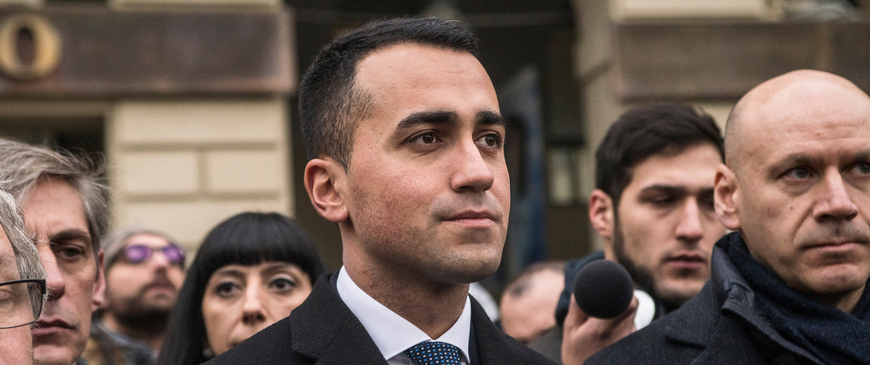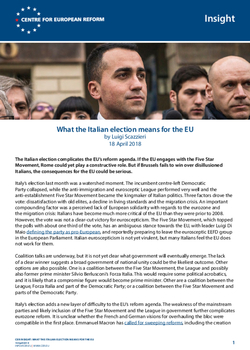
What the Italian election means for the EU
The Italian election complicates the EU’s reform agenda. If the EU engages with the Five Star Movement, Rome could yet play a constructive role. But if Brussels fails to win over disillusioned Italians, the consequences for the EU could be serious.
Italy’s election last month was a watershed moment. The incumbent centre-left Democratic Party collapsed, while the anti-immigration and eurosceptic League performed very well and the anti-establishment Five Star Movement became the kingmaker of Italian politics. Three factors drove the vote: dissatisfaction with old elites, a decline in living standards and the migration crisis. An important compounding factor was a perceived lack of European solidarity with regards to the eurozone and the migration crisis: Italians have become much more critical of the EU than they were prior to 2008. However, the vote was not a clear-cut victory for euroscepticism. The Five Star Movement, which topped the polls with about one third of the vote, has an ambiguous stance towards the EU, with leader Luigi Di Maio defining the party as pro-European, and reportedly preparing to leave the eurosceptic EFDD group in the European Parliament. Italian euroscepticism is not yet virulent, but many Italians feel the EU does not work for them.
Italian euroscepticism is not yet virulent, but many Italians feel the EU does not work for them.
Coalition talks are underway, but it is not yet clear what government will eventually emerge. The lack of a clear winner suggests a broad government of national unity could be the likeliest outcome. Other options are also possible. One is a coalition between the Five Star Movement, the League and possibly also former prime minister Silvio Berlusconi’s Forza Italia. This would require some political acrobatics, and it is likely that a compromise figure would become prime minister. Others are a coalition between the League, Forza Italia and part of the Democratic Party; or a coalition between the Five Star Movement and parts of the Democratic Party.
Italy’s election adds a new layer of difficulty to the EU’s reform agenda. The weakness of the mainstream parties and likely inclusion of the Five Star Movement and the League in government further complicates eurozone reform. It is unclear whether the French and German visions for overhauling the bloc were compatible in the first place. Emmanuel Macron has called for sweeping reforms, including the creation of a dedicated eurozone budget and finance minister, and a European Monetary Fund. Angela Merkel has appeared ready to sign up to a watered-down version, largely to avoid being seen as unduly negative towards the young reformer. But the Dutch argue that even a diluted Macronian agenda goes too far. The Italian election results raise a big question mark over whether Germany and other hawkish countries will trust the new Italian government to carry out significant risk reduction in its banking system or sign up to their agenda of fiscal discipline. Indeed, with Italy’s public deficit only likely to increase, German demands for risk reduction before risk sharing are only likely to get louder. The situation in Italy gives the Germans every excuse to go slow on eurozone reform.
Italy’s election adds a new layer of difficulty to the EU’s reform agenda.
Italy’s new political balance means that its next government is also unlikely to be instinctively supportive of other key issues on the European reform agenda. Neither the Five Star Movement nor the League like plans to establish a degree of conditionality in the use of structural funds by tying them to the rule of law, seeing this as an intrusion into national sovereignty. Both parties are also sceptical of the notion of a common European defence or procurement market. Italian politicians have limited appetite to expose an economically important sector to politically sensitive job losses, and some in Italy’s defence industry fear Brussels would favour larger French and German companies.
However, while the Italian election has made progress on many items of reform more difficult, Rome is unlikely to be a spoiler for the time being. Italian politics will likely be characterised by continuity as any Italian government over the next few years – and there may well be several – will essentially follow the same domestic and international priorities.
The first priority of any government will be to boost economic growth and increase employment. It is unlikely that the League or Five Star Movement would immediately violate the eurozone’s 3 per cent budget deficit limit. During the campaign, di Maio said he would abide by it, and the Five Star’s candidate for economics minister stated he would balance the books by boosting economic growth and increasing targeted public investment. Initially, the new government would probably push the deficit to just below 3 per cent, up from 1.9 per cent in 2017. However, Rome is likely to turn to a more assertive stance if this fails to have a significant impact, or if Brussels is seen to be inflexible. Italy could then come up with controversial ideas such as a domestic credit system to be used for settling tax payments.
The new Italian government, regardless of its colours, will also prioritise reducing migration flows from across the Mediterranean. It will continue taking unilateral action, dealing directly with Libya and other countries of origin and transit. Rome will also push for reform of the Dublin regulation, so that asylum applications no longer have to be processed in the country of arrival. Italy is also likely to attempt to revive the EU’s original relocation mechanism, designed to help share the burden of migration among member-states.
Italy’s new power balance could lead to some shifts in EU foreign policy. A future Italian government is likely to be more sympathetic towards Russia, as both the Five Star Movement and the League have voiced opposition to the EU’s sanctions and broader Russia policy. In the coming years it may well prove harder to significantly toughen EU policy towards Russia in response to an alleged action escalation by Moscow – especially if it is difficult to prove Russia’s culpability. However, the Five Star Movement and the League are unlikely to be able to alter the EU’s existing approach towards Russia. Although easing sanctions appears to be a genuine concern for the League, the Five Star Movement and the other parties are not as radical on this issue. Trying to remove sanctions would drain political capital that they would rather use in the economic sphere.
Pushing for a removal of sanctions would also harm Italy’s relations with the US, and both the Five Star Movement and the League insist they want good relations with Washington. And Italy’s president would seek to prevent such a rupture with the country’s Western allies at all costs. Instead of attempting to veto or ease sanctions, it is far likelier that Rome will attempt a balancing act that maintains EU unity while also boosting political and trade ties with Moscow. Many Italian politicians of all stripes do not see this as a contradiction – and point to Nord Stream 2 as evidence that other member-states have long been practising this.
Depending on how the EU responds to the new government, Rome could yet play a constructive role in the coming years.
The likeliest scenario is that Italy will be a drag on reform. But, depending on how the EU responds to the new government, Rome could yet play a constructive role in the coming years. Much still depends on how the views of the League and Five Star Movement evolve. The Movement has no experience of national government and has not yet had to articulate positions on many foreign policy issues. European leaders should constructively engage with the Italian government from the outset – no matter what preconceptions they may have about its policies. If they treat Italy as an outcast, they will push the Five Star Movement towards more eurosceptic positions. The EU has a chance to shape its outlook so that it matures into a reformist pro-European party. There is a significant chance that it could join a new reformist grouping in the 2019 European Parliament elections.
Migration is one key area where the EU could engage with Italy and show solidarity. Most of all, Italian officials want Brussels to invest in signing readmission agreements with African countries, making available funds of the same order of magnitude as the €6 billion the EU has pledged to Turkey. And, while many member-states remain bitterly opposed to any kind of numerically significant relocation of refugees, there could be scope for increased co-operation on the repatriation of those whose applications are rejected. Currently, member-states are able to repatriate fewer than half of those whose applications fail.
A constructive government in Rome would also open up new possibilities. On the eurozone, member-states could make progress towards a banking union: Italy has already reduced its stock of bad loans by a third from its 2015 peak. While Macron’s proposals are too ambitious, European leaders could work towards a small eurozone budget to stabilise shocks – perhaps the limit of what is currently politically possible. And, while the new government may not instinctively like European defence, it could change its mind if it sees that Italian companies can benefit. The League’s manifesto supports defence industry integration as long as it does not compromise Italy’s defence industry and its relationships with non-EU countries such as the US, and soon the UK. And, even though Five Star Movement and the League are sceptical of getting involved in foreign conflicts, and would not instinctively back Macron’s plan for a European Intervention Initiative, they could look favourably on efforts to stabilise the Sahel. Even the League advocated – in vague terms – a Marshall plan for Africa. Finally, while the EU will find it difficult to make structural funds conditional on the rule of law, it could increase efforts to tackle the corruption and cronyism in how they are managed.
There is a risk that disillusionment with the bloc will continue to fester in the eurozone's third-largest economy.
The next few years will be crucial for Italian and European politics. If the chance to reform eurozone governance is missed, and the EU does not do more to convince Italians that the EU benefits them, there is a risk that disillusionment with the bloc will continue to fester in the eurozone’s third-largest economy. If that should happen, Italy will increasingly become a spoiler, and when the next economic crisis hits, Italians will become more eurosceptic – to the extent that leaving the euro or the EU would no longer appear unthinkable.
Luigi Scazzieri is a research fellow at the Centre for European Reform.


Add new comment